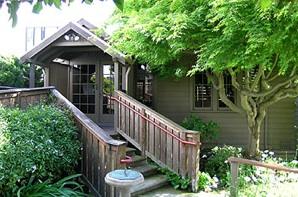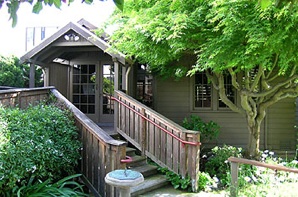“OperaLab gets its response from high energy, high adrenaline — and its intimacy.” So says Elizabeth Wells, the executive director of Berkeley West Edge Opera who founded the OperaLab project. A soprano by training, she will sing in an upcoming musical reading that features Mozart's Zaide (1780), an opera he left unfinished in favor of other projects.
OperaLab’s intimacy, said Wells, comes partly from the smaller venues it performs in — this time, the Berkeley Piano Club. “But it comes, too, from the backstage, behind-the-scenes feel,” she commented. “The unpolished feel of a reading, like a rehearsal ... only we’re facing the audience instead of each other.”
Wells as singer will be facing the audience with tenors Andrew Morgan and Alex Frankel, along with baritones Peter Tuff and Wayne Wong. Robert Ashens will preside at the piano.
Mozart intended Zaide for a new opera company proposed for Vienna by Emperor Joseph II as a German-language theater. It is a “rescue opera,” a kind of Orientalist genre popular in the 18th century, with the Barbary pirates roaming the Mediterranean and a sultan sitting not far from the Austrian Empire in Istanbul. Zaide has the title maiden, favorite of the sultan, falling in love with a Christian slave she gazes on as he sleeps. The two escape, are caught, are brought back in fetters to be judged ... and at that point the manuscript (which Mozart’s widow, Costanze, found after his death) abruptly ends. It wasn’t published till 1838, nor performed until 1866.
The opera has no overture, and the dialogue that was to be spoken is missing, as well. There is no definitive reason for Mozart to have dropped Zaide, but some think of it as a precursor, at least thematically, to the more comic Abduction From the Seraglio, which was the outstanding success, the following year, of the Emperor’s otherwise floundering German opera pipe-dream. The Zaide manuscript apparently convinced the national singspiel inspector (yes, there really was such a title), Gottlieb Stephanie, to commission Seraglio, which he collaborated on as adaptor.
In any case, Mozart wrote to his father that such a serious piece wouldn’t please Viennese audiences, stuck on comedies, and so he abandoned his speculative project in favor of a commissioned work: Idomeneo.
Various modern fixes have been applied to Zaide. Mozart’s Symphony No. 32 has been used as its overture. And Luciano Berio composed a completion in 1995. The missing spoken dialogue has even been essayed by various hands. OperaLab will use the most recent version, about five years old, with trimmed dialogue and a finale rounding out of the second act.
“I’ve wanted to do Zaide for a long time,” said Wells. “It’s been on my shelf. Then I went through an epiphany in 24 hours: Everybody I approached for casting said yes. It all fell into place.”
Wells is thinking about future OperaLab projects: early Verdi works, Offenbach one-acts, lesser-done Donizetti, perhaps Bizet’s Pearlfishers, Vaughan Williams’ Sir John in Love, operas by Carlisle Floyd, Jules Massenet, or Puccini’s first staged work, Le Villi. “Whatever’s calling to me,” she remarked. “I’ve kind of opened myself up to that.”
Wells noted that there was a paucity of concert-reading series for opera: “I haven’t run across much like this in the performing arts anywhere else, except staged readings in theater.” Wells spoke of “the resonance” of Berkeley Symphony’s Under Construction project (founded by Symphony Executive Director Jim Kleinman, who also founded Playground, a staged play-reading series). “In the classical performing arts,” she concluded, “it’s a time to reengage with and respond to the audience, to reach out and grab everybody, pull them into what’s going on. And the artists drawn to OperaLab are a magnetic lot; there’s a different energy.”


